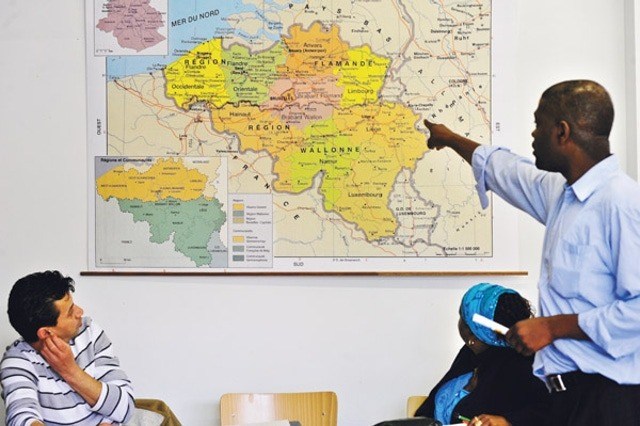The Court rules that the Dutch language test of the integration programme contains discriminatory provisions, warning that the additional conditions exclude too many people.
Non-EU newcomers hoping to stay in Flanders for over three months have to take a separate Dutch language test, which they must pass before receiving an integration certificate from the Flemish government.
Meanwhile, those who take the course compulsorily will soon have to pay a registration fee of a maximum of €180, while those who voluntarily take the course claim a reduction or exemption from payment.
For this reason, Ligo (an umbrella organisation for basic education) officially petitioned the Constitutional Court on 7 October, objecting to this particular aspect of the new integration policy, challenging this difference in treatment.
The Constitutional Court has now ruled that there are discriminatory provisions, including on the basis of nationality, in the Dutch language test of the civic integration programme, and has annulled the decision by the Flemish Government to do so.
Difference in treatment 'not reasonably justified'
Some 26,000 persons who wish to integrate take a 'Dutch as a Second Language' (NT2) course spread over 113 locations in Flanders. About half do so voluntarily, the other half follow a compulsory programme.
The court stressed that the fact people for whom the civic integrationist course is mandatory are excluded from receiving a reduction or being exempt from having to pay for the course is discriminatory.
Tweet translation: "It is unconstitutional to exclude compulsory integration students from exemptions, reductions and refunds of registration fees for the Dutch second language training package."
The judges pointed out that both categories of people who are integrating may be in a difficult socio-economic situation. The difference in treatment is therefore not reasonably justified.
"Although the difference in treatment is formally based on that criterion, the Court also takes into account the fact that the contested provisions entail less favourable treatment of certain foreign nationals in so far as a much higher percentage of foreign nationals are required to follow an integration route," the Court ruling read.
"The people concerned thus suffer a specific disadvantage based indirectly on their nationality." The articles in question are annulled.
Removing obstacles
Ligo welcomed the ruling, stating that the registration fee is a big barrier for people who have to take the course. "Motivation is certainly not lacking. They want to learn Dutch, find a job, be able to take care of their children, and so on. So we are glad we were able to stop the registration fee."
Johan Danen of Groen (Flemish Greens) also talks about an unnecessary obstacle. "If we want newcomers to learn Dutch, it is up to the Flemish government to remove as many barriers as possible," he said. "By making people pay for language tests, it did just the opposite. It is good that the Court is now removing that extra obstacle."
Education Minister Ben Weyts welcomed the fact that the Constitutional Court ruled that the NT2 test is not a violation of educational freedom, as was also argued by the claimants. He also argued that the problem with the registration fee is not insurmountable.
"I hope we can now turn the page once and for all and reach a solution for the registration fee. We must now move forward together to make civic integration a success," Weyts said. He will now have to decide whether everyone or no one has to pay enrolment fees.
More changes are underway for the test: from September, all non-native speakers will take a standardised test. However, this deadline has been deemed unrealistic.
Until now, each Centre for Adult Education (CVO) and Ligo centre had its own training and Dutch language test, but these differences between the education centres in the region's provinces meant that language levels were inconsistent.
Related News
- Understanding Belgium: Is civic integration mandatory for all?
- Compulsory Flemish integration test by September deemed 'unrealistic'
The Constitutional Court also ruled against the reform of Flemish Social Protection implemented by the Flemish government in 2021, which meant those wishing to claim a care budget had since had to meet a 10-year residence condition instead of a five-year one and also had to have an integration certificate.
It noted that this was also unconstitutional, stating that these additional conditions lead to a "significant deterioration of the level of social protection previously offered." Thus, users simply have slower and less easy access to the care budget. There is "no reasonable justification" for the introduction of the integration condition, according to the Court.

